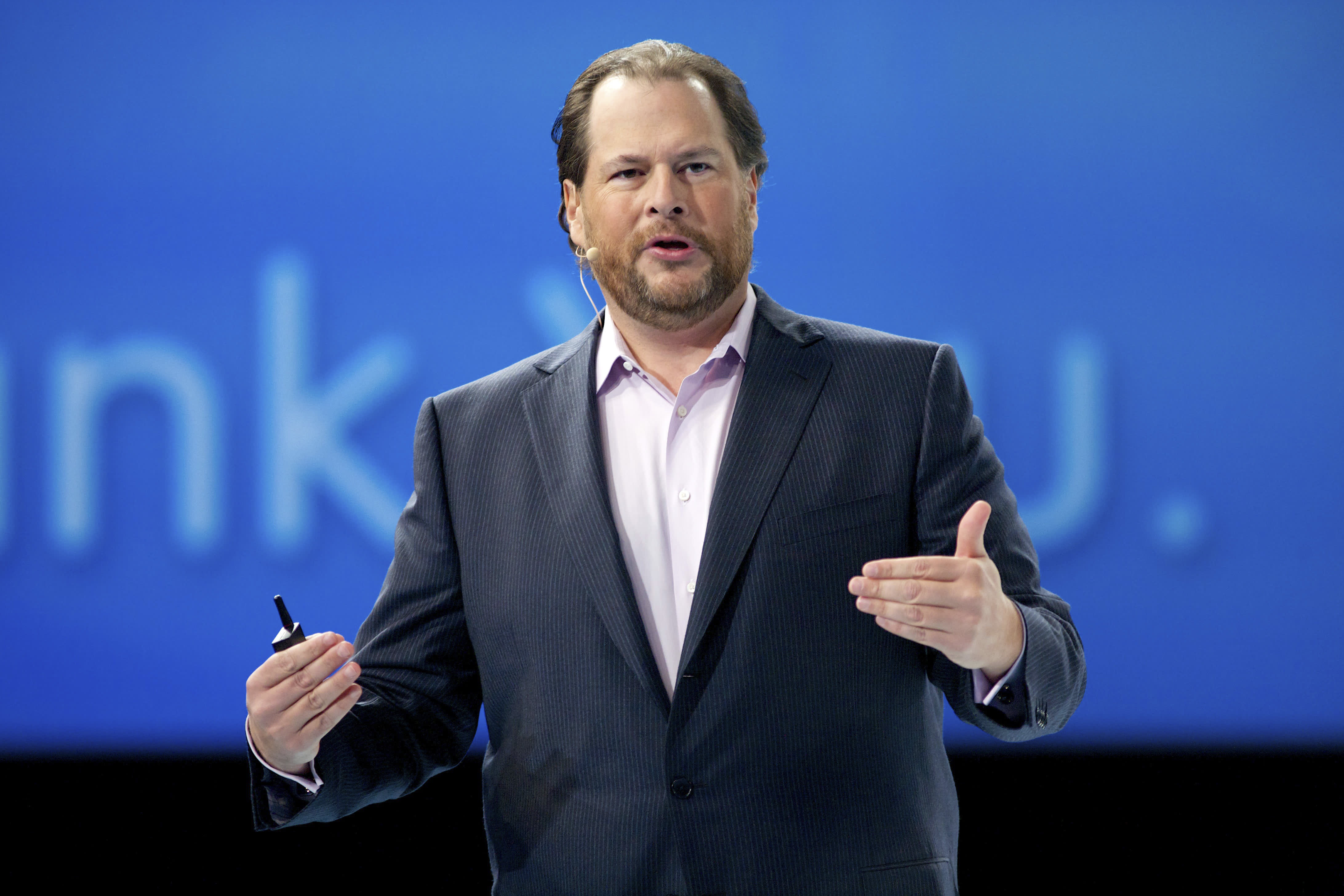
Marc Benioff, founder, chairman and CEO of enterprise cloud computing company Salesforce.
Kim Kulish | Corbis News | Getty Images
Salesforce is making the biggest acquisition in its 21-year history, announcing on Tuesday that it’s buying chat software developer Slack for an enterprise value of $27.7 billion.
Through a combination of cash and stock, Salesforce is purchasing Slack for $26.79 a share and .0776 shares of Salesforce, according to a statement. Prior to initial reports of a deal last week, which led to a 38% pop in Slack’s shares, the stock was trading at under $30.
The purchase marks one one of the largest ever for the software industry. The biggest was IBM’s $34 billion purchase of Red Hat in 2018, followed by Microsoft’s $27 billion acquisition of LinkedIn in 2016. Last year, the London Stock Exchange agreed to buy data provider Refinitiv for $27 billion, though the deal has yet to be cleared by European regulators.
For Salesforce, the Slack deal is the latest in CEO Marc Benioff’s multi-year acquisition spree. The company spent $15.3 billion on data visualization company Tableau in 2019 and, a year earlier, shelled out $6.5 billion acquisition for MuleSoft, whose back-end software connects data stored in disparate places.
Salesforce, which got its start by developing cloud-based software for sales reps, has dramatically expanded its reach in recent years and, along the way, become one of the most valuable software companies in the world, passing Oracle, SAP and IBM as well as other legacy tech companies like Cisco and Intel.
Salesforce vs. legacy tech
CNBC
By acquiring Slack, a business chat service with over 130,000 paid customers, Salesforce is bolstering its portfolio of enterprise applications and filling out its broader software suite as it seeks new areas of growth.
Salesforce’s annualized revenue topped $20 billion in the fiscal second quarter, with growth of 29%. But the forecast for the full year of 21% to 22% growth would represent the company’s slowest rate of expansion since 2010. Slack is projected to grow 39% this fiscal year, which ends Jan. 31, to $876.3 million, according to analysts surveyed by Refinitiv.
The acquisition will further intensify Salesforce’s rivalry with Microsoft, whose Teams chat and video service has emerged as Slack’s stiffest competitor.
“This deal will be a major shot across the bow at Microsoft,” wrote Dan Ives, an analyst at Wedbush, in a report on Monday. Ives, who recommends buying Salesforce shares, said Teams “has been a clear hurdle to growth” for Slack and that the market will now be “a two horse race between Microsoft and Salesforce.”
The companies are battling in a number of other areas. Salesforce is the dominant player in customer relationship management software, where Microsoft is a distant challenger. Both companies tried to buy LinkedIn, the professional networking site, but Microsoft was the ultimate winner.
With last year’s purchase of Tableau, Salesforce jumped into the data visualization market, taking on Microsoft’s Power BI. The companies also go head-to-head in productivity software, though Microsoft’s Office suite controls the market along with Google. Salesforce acquired Quip in 2016 but hasn’t picked up much momentum against Microsoft and Google.
The Slack pivot
Slack has been one of Silicon Valley’s legendary stories over the past decade, orchestrating one of the wildest pivots the industry has ever seen.
The company was originally founded in 2009 as an online gaming company call Tiny Speck. It was created by Stewart Butterfield, who had tech fame for previously starting photo-sharing site Flickr and selling it to Yahoo. Andreessen Horowitz, Accel Partners and Social Capital were among Tiny Speck’s early backers.
Tiny Speck’s game, Glitch, was a failure. But over the course of working on it, Butterfield’s team built a product to help them communicate with one another and to share files. They shut down Glitch and focused on chat, opening it up to customers in early 2014. By October of that year, Slack had 30,000 teams signed up, including at Salesforce, and attracted funding from Google’s venture arm at a valuation north of $1 billion.
Slack’s annual revenue topped $100 million by early 2017 and reached $400 million two years later. The shares debuted on the New York Stock Exchange in June 2019, through a direct listing. The stock, which opened at $38.50, has been on a roller-coaster since, trading near $17 in March of this year, before climbing back close to $40 in June and then dropping back below $25 in mid-November.
Much of the volatility can be attributed to Microsoft.
“We have been surprised by the limited success Slack has seen from the pandemic and the rise of remote work,” wrote Rishi Jaluria, an analyst at D.A. Davidson, in a report last week. “Microsoft Teams has been able to capitalize on the opportunity presented by the pandemic better than Slack, in our view, and this rapid growth in adoption has hurt Slack.”
WATCH: Would Salesforce buying Slack be offensive or defensive?






















